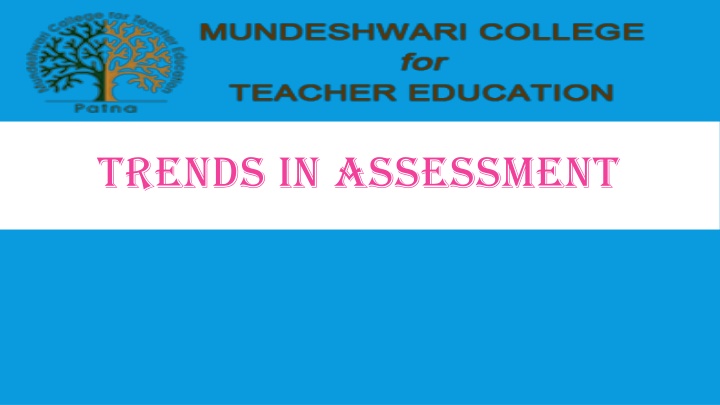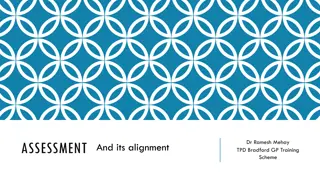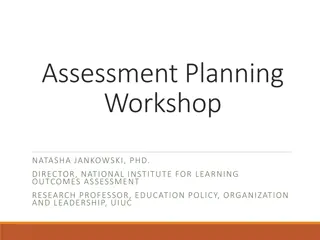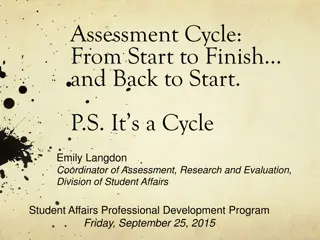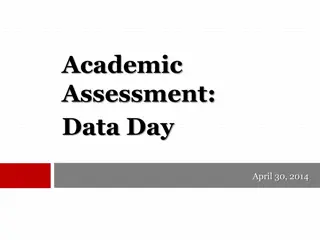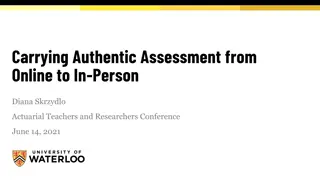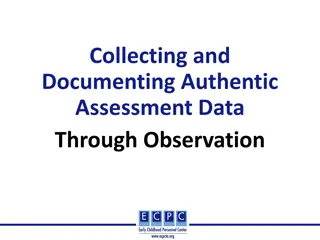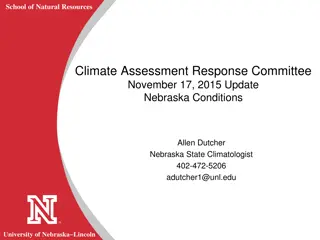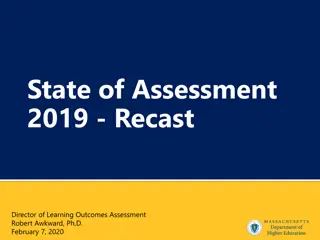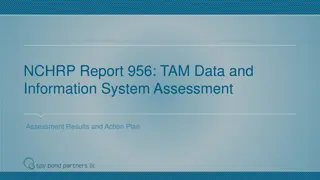Trends in Assessment
Assessment plays a crucial role in education, guiding teaching strategies and improving student learning. From the origins of assessment to its modern applications, discover the various trends and purposes that shape this essential practice. Explore the introduction, meaning, definitions, and purpose of assessment, along with the impact of online examinations on educational assessments. Learn about the significance of remote assessments throughout the different stages of the teaching process, from planning to action.
Download Presentation

Please find below an Image/Link to download the presentation.
The content on the website is provided AS IS for your information and personal use only. It may not be sold, licensed, or shared on other websites without obtaining consent from the author.If you encounter any issues during the download, it is possible that the publisher has removed the file from their server.
You are allowed to download the files provided on this website for personal or commercial use, subject to the condition that they are used lawfully. All files are the property of their respective owners.
The content on the website is provided AS IS for your information and personal use only. It may not be sold, licensed, or shared on other websites without obtaining consent from the author.
E N D
Presentation Transcript
INTRODUCTION OF ASSESSMENT INTRODUCTION OF ASSESSMENT The word 'assess' comes from the Latin verb 'assidere' meaning 'to sit with . Assessment is a systematic process of gathering, interpreting, and acting upon data related to student learning and experience for the purpose of developing a deep understanding of what students know, understand, and can do with their knowledge as a result of their educational experience.
MEANING OF ASSESSMENT MEANING OF ASSESSMENT In Assessment teacher gather, summarize, and interpret data to determine which strategies to implement to further enhance the learning experience. Assessment are an integral part of teaching and learning. It requires planning specific ways to use assignments and discussions to discover what students do and do not understand.
DEFINITIONS OF ASSESSMENT According to Palomba and Banta, "It is a systematic collection, review, and use of information about educational programs undertaken for the purpose of improving student learning and development. According to Allen (2004) "Assessment involves the use of empirical data on student learning to refine programs and improve student learning.
PURPOSE OF ASSESSMENT PURPOSE OF ASSESSMENT The are many purposes of assessment :- Selection and grading. Maintaining standards. Diagnosing learning difficulties. Proving feedback to support the learning process. As a source of information for evaluating the effectiveness of the teaching/learning strategy.
ASSESSMENT IN ONLINE EXAMINATION ASSESSMENT IN ONLINE EXAMINATION Online exams are increasingly shaping educational assessments. Until recently, everybody had to gather in a classroom at the same time to take an exam. Today online assessments allow students to take exams on their own time, with their own devices, regardless of their schedule or home situation.
. Remote assessments have different purposes during many stages of the teaching process :- Planning: Assessments help you formulate a plan to teach students. Doing: The teaching plan generated by assessments helps you more effectively perform the task of teaching. Checking: Assessments evaluate whether your desired teaching outcomes are being reached by students or not. Acting: Assessment results give you actionable criteria for adapting your class
COMPUTER BASED EXAMINATION COMPUTER BASED EXAMINATION Computers have impacted everything and everyone over the course of their rise in the past few decades. During this technological revolution, the education and training industries have experienced what can be aptly described as meteoric shifts. Learning and assessment have evolved at a remarkable pace. Ebooks have replaced books and training manuals, physical classrooms have turned into online classrooms, and paper-based tests have become computer-based assessments. For a very long time, until the arrival of computers, paper-based tests were the only assessment method available to educators & trainers.
THEY WOULD NEED TO: create a set of questions print copies distribute the papers to the learners wait for the learners to complete and submit the test grade the tests manually and write feedback prepare reports
OTHER TECHNOLOGY BASED OTHER TECHNOLOGY BASED EXAMINATION EXAMINATION It is widely acknowledged that technology and the digital environment offer a range of opportunities and added value traditional assessment activities, methods, and processes. The affordances of technology-based assessment revolve around. Access to assessment from potentially any geographical locations and at any time. Automatized administration allowing students to undertake online tests many times and re-assess their knowledge. Enhancing static presentation of assessment items with interactive and media-enriched content.
. Computer data-processing capabilities such as automatic scoring and adaptive testing. Sophisticated reporting including both the easy gathering and analysis of student responses or behavioral data to allow the marker to refine and adapt assessment activities and instruction. Cost efficiencies emerging from scaling and automatization. Beyond an operational and efficiencies focus of technology-based.
MERITS :- Flexibility Reduced costs More free time Increased Course variety Increased collaboration Enhanced time management skills
DEMERITS :- On courses require more time than on campus classes. Online courses require you to be an active learner. Online courses require that you find your own path to learning. Online courses require you to be responsible for your own learning Online students feedback is limited
CONCLUSION CONCLUSION We can conclude that Assessment can range from simply asking question during a lesson to class presentations after a unit of study. Assessment is not only a way we can measure student performance, but it is also a way for teachers to plan instruction and reflect on their own methods of teaching.
